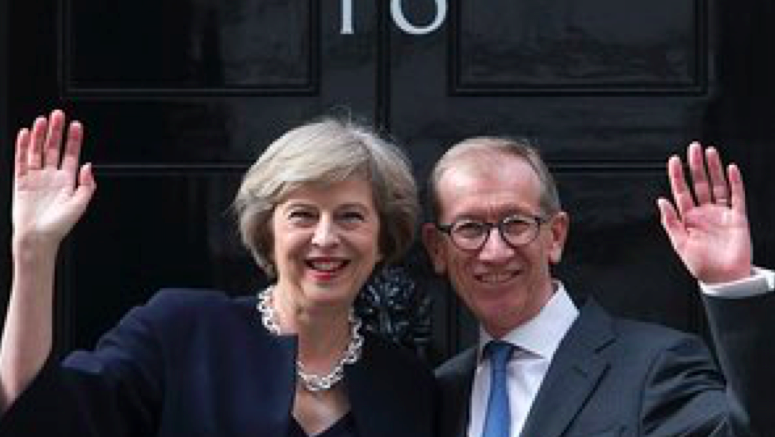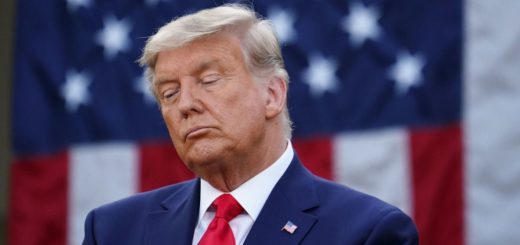Guardian view on Theresa May – New PM, Same Old Problems

Editorial in the Guardian,UK, 14 July 201611
A fresh face won’t make Brexit, the budget deficit or a tiny working majority disappear. The prime minister faces daunting challenges
Theresa May and her husband Philip outside 10 Downing Street on Wednesday as she becomes Britain’s second female prime minister.
(Note: The first pledge and commitment Theresa May took on assuming office as new PM was “to work not for the interests of the privileged few but for those of every ordinary working-class person in the country.” She has to first find out how many of these belong to the 17 millioon who want to leave EU and how many want to stay. Briton’s economic future can never flourish in isolation, that is, totally outside Europe’s common market. But how can she enjoy the benefits of the common market and also entertain the illusion that she can block the free movement of people from Europe or elsewhere coming as immigrants while not paying EU-membership fees? There should be give and take in negotiations. One cannot have the cake and eat it. To enjoy the benefits of common market Mrs. May have to cast aside present objection to free or regulated immigration policy. In Angela Merkel in EU she has a person of similar temperament to discuss with. Both are daughters of Pastors, sweet and gentle in dealings but very very firm on principles. The success of Brexit may finally be decided by the success of negotiations between these two great no-nonsense ladies. All of us have to wait and see. james kottoor, editor)
Mid-term handovers from prime minister to prime minister are an odd business. David Cameron drives into the inner courtyard of Buckingham Palace as prime minister, and within the hour Theresa May drives out as his successor. Yet although the face and the name are new, the problems that hemmed in Mr Cameron for his six years in office will hem in Mrs May just as tightly. No money, not much of a majority and one massive headache: Europe.
Mrs May will have to fight her way past all these hazards if she is even to begin to develop the interesting ideas that she set out in her first and, as it turned out, her only campaign speech in Birmingham at the start of the week. An industrial strategy, a bigger role for cities, a tough line on tax dodgers and an economy that works for everyone are likely to be ideas queued behind the huge challenge of negotiating Brexit on the best possible terms, while the economy slows and six years of squeeze on the NHS, council budgets and schools throw up more and more acute problems. There is, though, one dramatic difference that she can make: she can, and the signs are that she will, feminise the topmost regions of politics in a way that has the potential to transform the conduct of government.
She stood on the steps of No 10, only the second ever female prime minister, nearly 26 years after Margaret Thatcher left, red-eyed, and she delivered one of the boldest statements of intent a Conservative prime minister may ever have made. If she envisaged this as a way of introducing herself to the voters who will never have paid much attention to her in the past, she will have made an impact. In part she repeated and elaborated on the promise she made in her Birmingham speech on Monday. Reviving the Unionist part of the Conservative and Unionist party’s full title, she made a striking commitment to preserve the United Kingdom, the “precious bond” that holds the nations together – and then she extended it to refer to the bonds between every citizen.
She paid tribute to Mr Cameron, and then pledged to work not for the interests of the privileged few but for those of every ordinary working-class person in the country. This was a statement that, like Margaret Thatcher’s Francis of Assisi quotes a generation ago, may turn out to be a terrible hostage to fortune. But it demonstrates a singleness of purpose that should not come as a surprise from a woman who has translated herself from the longest-serving home secretary in modern times to the top job in politics in less than a week.
The glaring omission from her statement was anything of substance about the crisis in which the UK finds itself after the vote to leave the EU. No hint of how she thinks the Brexit negotiations should be conducted, nor what her bottom line will be. Over the next 24 hours, much more will emerge. We will learn who will fill the big jobs at the top of government. But Brexit will dominate the political landscape for at least the next two years; the biggest job after the prime minister herself will be that of minister in charge of the negotiations. Mrs May – the first home secretary to reach No 10 since James Callaghan in 1976 – has argued that a balance can be struck between access to the single market and the free movement of people. She will fight to protect the City, where her whole non-political working experience was gathered. And it was evident from the very first thing she said that she will put at the heart of everything she does the infinitely fragile business of finding a way to allow Scotland the maximum possible access to the benefits of EU membership without destroying the union.
But she sees herself as a unifying prime minister. She has big ambitions for domestic policy. Largely state-educated, Mrs May has supported the expansion of a grammar school in her constituency, and she has talked of making her own schools policy a priority. But she will remain hawklike on security: her successor at the Home Office will inherit the snooper’s charter, still being picked over by hostile peers. She will not backtrack on austerity; and if she hinted at an end to tax breaks for the rich, there will no resiling from the Tory image as a low-tax party.
As party chair, Mrs May was a driving force behind the effort to recruit more female MPs. As a result, she inherits from Mr Cameron a pipeline of women with the experience for promotion. In Amber Rudd, Justine Greening and Theresa Villiers, she has experienced cabinet ministers to put into big jobs. How differently can politics be done by women? We may, at last, be about to find out.
















